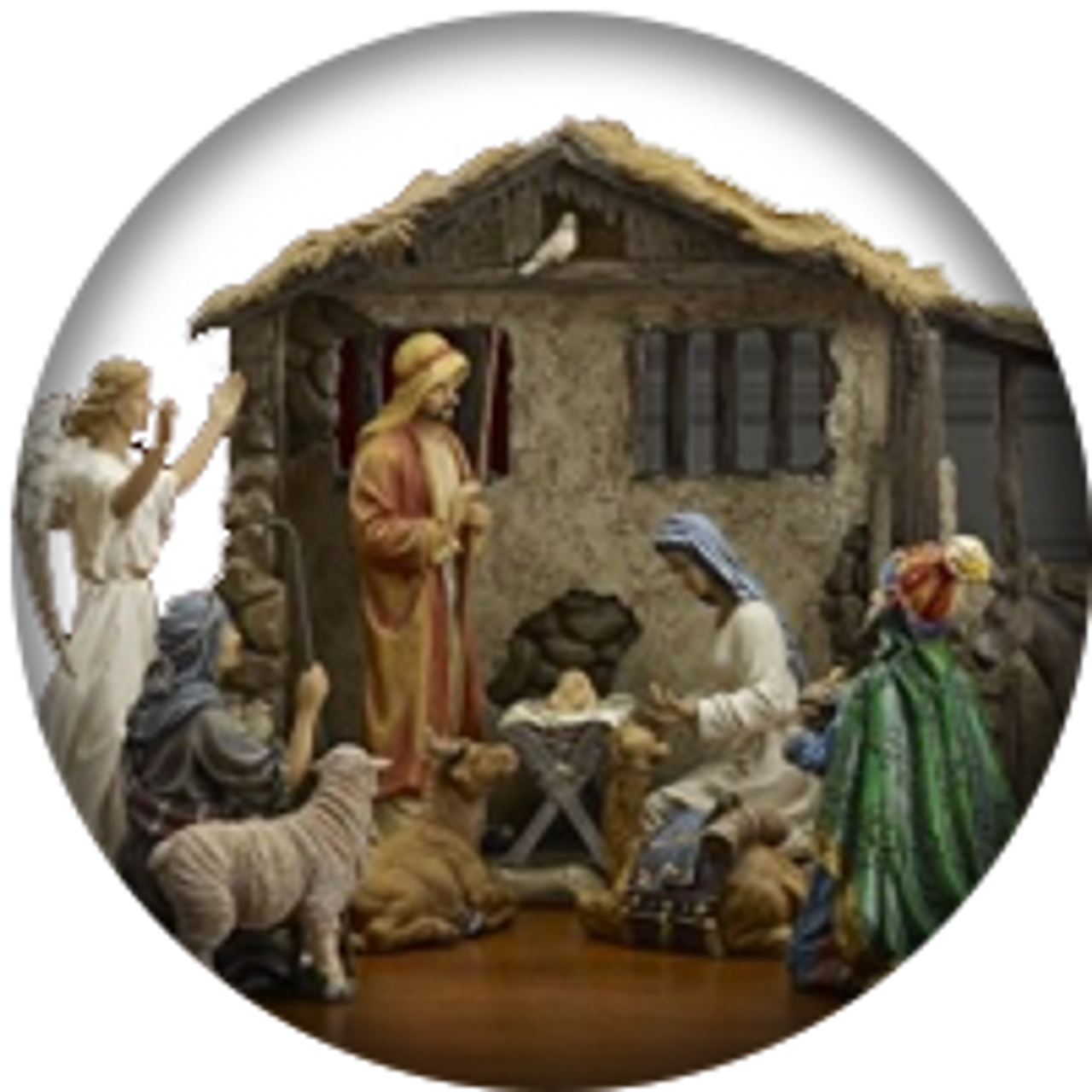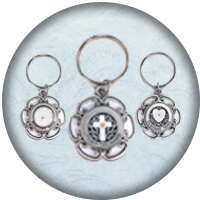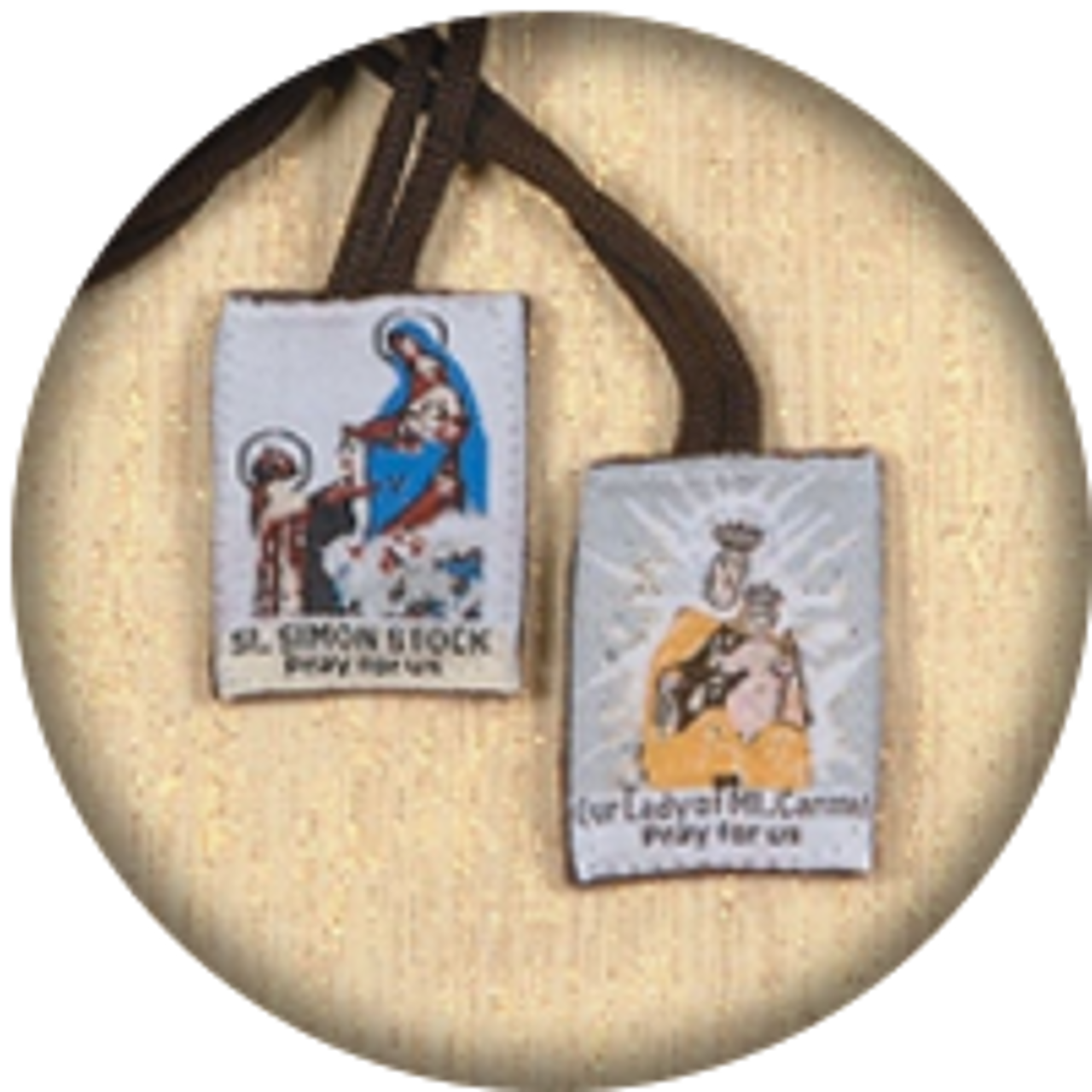THE CROSS OF CHRIST— THE JOY IN IT? Part II of the series: PASCHAL MYSTERY, JOY AND DIVINE MERCY
Kathy Boh on 21st Feb 2020
THE CROSS OF CHRIST—
THE JOY IN IT?
Part II of the series: PASCHAL MYSTERY,
JOY AND DIVINE MERCY
PASSION and DEATH
lead to JOYOUS RESURRECTION
The theme is based on the scripture:
“For the sake of the joy that lay ahead, He endured the cross.”
TO JERUSALEM TO DIE
"‘Jesus enters Jerusalem in order to die on the Cross. And it is precisely here that his kingship shines forth in godly fashion: his royal throne is the wood of the Cross! Why the Cross?
Because Jesus takes upon himself the evil, the filth, the sin of the world, including the sin of all of us, and he cleanses it, he cleanses it with his blood, with the mercy and the love of God. Let us look around: how many wounds are inflicted upon humanity by evil! Jesus on the Cross feels the whole weight of the evil, and with the force of God’s love he conquers it, he defeats it with his resurrection.
This is the good that Jesus does for us on the throne of the Cross. Christ’s Cross embraced with love never leads to sadness, but to joy, to the joy of having been saved and of doing a little of what he did on the day of his death.’” 1
JOY AT THE THOUGHT OF BLOOD-BOUGHT BLESSINGS
“For the sake of the joy that was set before Him, He endured the cross.”
This scripture—a simple little statement—says so very much concerning Jesus in regarding his own perspective toward the worst time in His earthly life: “For the sake…” [Hebr. 12:2]. I believe that literal volumes could be written on that one verse—and all the foundations of truth that lie behind it.
This reminds me of the opening statement in the book, Tale of Two Cities: “It was the best of times, and the worst of times…” Ours is a tale of two kingdoms…
Quite different things were going on surrounding one horrifying reality...The kingdom of this world has not seen a match for the tribulation that Jesus went through. The “god” of the kingdom of this world (and some earthly men of religious and political power) thought—for a brief moment—that they had put an end to Jesus Christ and all He is and was. But the kingdom of heaven could not rejoice more over the results of His life freely given…and all that followed—all the salvations, deliverances, healings, new life, graces, fruitful lives, gifts, blessings, love given and received, etc.—then and now, after His incomparable sacrifice.
Faith gives us sight to see...
If we go by sight and not by faith, we, too, could make the mistaken judgment of “supposed” victory of the world and the devil over Jesus Christ in His passion and death (and, incidentally, over us when we go through our own defeats and dark times). But the enemy's earthly victory was both deceptive and temporary… as faith gives us sight to see. Though the suffering and pain endured was quite horribly and tangibly felt, the joy that was the motivator to endure the cross was connected, basically, to us… and concerned us. Jesus knew Himself as the Savior… the Way… the Truth… the Life… the gate (the sheep gate)… the door that would open everlasting life and countless blessings to “whomsoever” would believe and “enter through the narrow gate”.
JOY—BEFORE, DURING OR AFTER?
We are not exactly sure at what point in time Jesus had that deep, decisive joy (referring to the above quote: "for the sake of the joy...").
Was it present in a deeply peaceful way throughout much of His life, and before his physical agony... but still during much spiritual, mental, and emotional anguish—during the extended time period of knowing (to whatever extent He knew) what lay ahead? Even before His actual timely decision to make His final trip to Jerusalem, He was still continually led by His Father in the power of the Holy Spirit toward those events of His Passion and death.
Was that core of joyous motivation present throughout the years? How many years? How consciously? How long and deliberately… was He “set[ting] his face like flint” [Isa. 50:5-7] toward this final destination and price paid?
Was it actually during the time covering the Last Supper, His Passion and His death that He received a deep inner gladness to help motivate and sustain him, knowing the enormous impact of His saving act?
Or did it remain a faith-filled promise of "joy"--literally that was simply believed to "lay ahead"...totally against all evidence of circumstances and feelings?
Or was it all of the above? Joy can be manifested in more quiet, peaceful ways—grateful, focused, motivating, steady and secure. One way or another, Jesus chose to look ahead to joy while foregoing “present” happiness. Earthly, tangibly felt happiness was the absolute, definitive polar opposite of His Passion and death. (But it doesn't end here, with suffering and death. More later about glorious restoration and bright outcome... even, at times, that we may discover on this earth.)
Isaiah 53 sheds some light. Throughout this chapter, Isaiah foretells the suffering of Jesus Christ with amazing description and detailed accuracy. He also sheds light on God’s plan and on Christ’s motivation. "...But it was the Lord's will to crush him with pain, by making his life as a reparation offering...their iniquity he shall bear...the Lord's will shall be accomplished through him... "
The joy that lay ahead? "He shall see his offspring [blog note: those receiving “new life” in Jesus Christ, to refer to Jesus’ words to Nicodemus]…[He] shall lengthen his days..." We are his "offspring", whom he sees and delights in. And his days (physically) were lengthened in resurrection life—as ours will be eternally when we receive our resurrected bodies.
How did his knowledge of what lay ahead impact him? "Because of his knowledge, he shall be content" [have that quiet joy within]… "My servant, the just one, shall justify many...Therefore, I will give his portion among the many" [His new life; His righteous justification; His victory over sin and death; His everlasting life— to share with new brothers and sisters, sons and daughters of God the Father, etc.], "and he shall divide spoil with the mighty..."
"...Because he surrendered himself to death, and was counted among the transgressors, bore the sins of many, and interceded for the transgressors." [Isa. 53:10-12]
FOCUS MAKES A DIFFERENCE
Before we go any further, we need to look at “joy” and some related words.
We can even look at “joy” amid the non-joyous (even tough and painful) circumstances.
One might say that we could look at “gladness” on several levels—both deeper and more sustainable, and the more periodic and superficial. We have the quick laugh that hits and passes quickly, and we have the most unfathomable depths of true, abiding joy—even the joy that runs deep. And—like it or not—when life gets rough, challenging and/or heavy, it helps to have any kind of a lift! (I, for one, will take the entire extent of possibilities.)
We mentioned some of this in a previous blog series that we did a few years ago (on humor, joy and happiness) and presented the concept that focus makes a difference. God actually tells us so. Let’s look at Philippians.
FOCUS (THINK) ON THESE THINGS
Philippians 4:8 declares:
“Whatever is true, whatever is honorable, whatever is just, whatever is pure, whatever is lovely, whatever is gracious, if there is any” [yes, any at all…even a smidgen of] “excellence, and if there is anything” [yes, anything at all] “worthy of praise, think on” [focus on] “these things”.
Our focus really does make a difference. I believe there is great wisdom in this statement: "If there is anything worthy of praise, think about these things…” This does not mean that we ignore or deny pain, trouble, sickness, grief, hardship, wrongdoing, etc. Nor does it mean that we fail to deal wisely with life and its trials.
What about the pain that Jesus endured? The pain must have been screaming from every nerve in His body. How could He “focus”on the (“true …honorable… just… pure… lovely… gracious… excellent… worthy of praise” [Phil 4:8 again]) “joy” that “was set before Him”? What could cause such joy in the midst of (or at the anticipation of) the all-time epitome of the opposite of “happy experiences”? Was it that he could imagine those who would come to—and through—Him to salvation and eternal life, all the while knowing far more than we do exactly what that meant to have [salvation] or to miss [eternal life in heaven] forever?
There are several things that Jesus could have thought, or He could have known—as a joyous thought. One would be: that because He was willing to endure the horrors of suffering that should have been ours because He could then spare us by paying a price we could not possibly pay as sinners. Also, He could do what only He could do, and was sent to do. He knew that only He could be the sacrifice/price paid for sin—as perfect holiness Personified. He was Son of God, but also fully God, while being fully man. He could then (prefer to) think of all the benefits to and for us with joy, rather than focus on (although not ignoring) the sure knowledge of the excruciating ordeal that He would, and did, endure.
So what about focus? The issue is this: where we focus in our thinking and what we emphasize and dwell on in our thoughts, conversations and [in directing] our emotions does make a difference. Emotional reactions will break through, in life, at any and many unexpected times. That's natural. We can, however, make choices to direct thoughts and examine what we choose to believe concerning the thoughts that are causing the emotional reactions. These thoughts and choices can re-direct our feelings or keep us from letting negative emotions control our lives. It can help open us up to God's graces for new hope and living in His love.
Where we look and what we choose to dwell upon can change our perspective; our mood; our motivation; our attitude; and our plan of action (or inaction, if “waiting” and “resting in the Lord” is appropriate). A quick test of this is to simply take a few moments… and focus on the polar opposites of those good things listed to think about. See what results.
I believe part of what sustained joy encompasses is an openness to good things (“above” or around us)—even when we are not actually feeling “good”. (That gets us back to focusing on even the “smidgens”.) Joy has something to do with the capacity to en-joy… Again, to appreciate things, whether they be tangible or intangible, things or people, concepts or colors, God’s beauty in nature or some human creative endeavor. The list goes on.
REJOICE!
In Philippians, we are asked to “Rejoice!” … “Rejoice in the Lord always.” [Phil. 4:4] Even when we can find little to feel happy about at any given time, we can find reason to rejoice in Him because of the steadfastness of Who He is—and even on good things He has done for us or others in the past, or will be doing in the future.
Again, what about Jesus? He knew that after His brutal torture and death, there would be so much (and so many) to rejoice over: our cleansing from sin and resultant new life; the availability of forgiveness, grace, power from on high, healing, deliverance—and every blood-bought blessing that anyone would ever receive… for millions of lifetimes, and for the duration of eternity itself.
We know (and sometimes need to remind ourselves) that "Who He is" never changes. He is always “good”—good that is both known and unknown, revealed and unrevealed, imagined and unimaginable, experienced or not.
Joy can even go into humble faith realms as we acknowledge ALL the unknown, unrevealed, unexperienced and unimaginable goodness, love, etc. of God. We can assert and acknowledge those things even when we are far from feeling it. When we do that, we are exercising what is a true and other-centered love of God. If we do that when we are not feeling happy or joyful, we are especially choosing to do so with a trusting, open heart.
In verses 6 and 7 of Philipians chapter 4, God encourages us to cover our anxieties and requests—and everything else—with prayer, petition, and thanksgiving. Then, when we do that, we can discover God’s very own gift of “peace… that surpasses all understanding” [In other words, we can’t comprehend how we could have peace amid ‘this particular’ situation or experience, but, amazingly, we find it. He gives it to us.] It’s a comfort to know that He wants to give it: peace/ tranquility/ harmony/ security/ mutual accord between and among His children on earth—and especially a calm, anxiety-free ability to relate to God, Himself.
Internal peace—deriving from a trust in God and His steady, unwavering care— is one of the foundations, I believe, of sustained joy. That is not to say that, having found it, we can avoid fighting to see it maintained. Not surprisingly in this world of “tribulation” [as Jesus said], it is a battle.
THE FRUIT OF JOY
The fruit of “joy” goes beyond surface emotions (which are fleeting) and often has something to do with some other deeper sustained attitudes, choices and perspectives. It includes the capacity to be grateful, give love, and appreciate goodness and beauty when, by “feeling” or “appearances” alone, what’s good or lovely would seem to be—at certain times—in short supply.
"Fruit", by its nature, is the end product of a process. Seeds need to be planted in good soil... then tended, cultivated, weeded, watered... and receive the right amount of sunshine. Plants... then trees... need to be pruned and protected from insects and invasive "critters"... The bush, plant or tree needs to mature enough to produce the fruit, first with blossoms forming—which cannot be picked if fruit is to be produced and come forth.
The "showy" blossoms fall away, and their core becomes the heart of the fruit that grows. The fruit, then, must first grow to a mature size, and then ripen to be both tender and sweet. Quite a process. So must we let—and patiently allow— the Holy Spirit to form His fruit in us. It takes our cooperation, for sure, but the “vine-dresser” or gardener is the Lord Himself. We need to continue to stay “planted” in His kingdom, and in His loving hands and wise care.
SELF-SACRIFICING LOVE VS. HAPPINESS
That very real love—so broad, so deep, so enduring (quite literally, self-sacrificing)—helps produce a level of joy as a mind-set and a heart-set that goes far below the surface circumstances of life.
This kind of joy is the opposite of circumstantial “happiness”. Its source of gladness runs deeper than momentary pleasure or satisfaction or fun. What happens when those more pleasant things are not so available? For some, those things are their purpose for living. But what happens when we find them in short supply, for some reason—an absence of “happy” circumstances—for longer than we had hoped, or even for a brief period of time? How do we cope? What helps us to function?
We look at what Jesus did. Our God of love—Who IS “Love”—allowed His love to carry Him… to be the reason, the driving force, and the primary influence (amid all the torturous fleshly reasons to quit or count us “not worth the price”) to endure the unendurable. What level of love (at the thought of, or the immediate experience of, such agonizing suffering) must someone have/ possess/ abide in to even consider “joy” as an option amid such potential or very present and cruel torment?
Certainly we can all agree that “foregoing present happiness” for our sake is clearly what Jesus chose. How did Jesus—as human/ "man" (while simultaneously being "God" but) dependent on His Father’s care and guidance, and on the Holy Spirit’s presence—find that joy, in the midst of circumstances that totally ruled out “happiness”? “For the sake of the joy that lay ahead…”
Yes, angel(s) ministered at the Garden of Gethsemane. He had the presence of the Holy Spirit (Who had been manifested at His baptism in the River Jordan). It is clear, however, that the emotional feeling of connection was seemingly absent with the Father as He cried out, “My God, My God—Why have You forsaken Me?” There are various meanings to this verse. (In fact, how often do we miss the layer after layer depth of meaning in many scripture verses, put there by the endlessly “deep” Author, the Living Word, our God?)
The meaning of this verse covers more than an emotional sense of rejection. 2Cor 5:21 says that “[God] made Him to be sin who did not know sin so that we might become the righteousness of God.”There are many who explain that the Father turned momentarily away from Jesus as a holy God would turn away from sin.
Circumstantially, dramatically and demonstratively, Jesus felt abandoned—deserted—by the Father God Who was the only One on Whom He could depend. Yet He chose to still trust and obey that very same Father (through physical, mental and emotional horrors) while there were no tangible signs of His presence. Jesus may not have necessarily had even the “feelings” of the comfort or encouragement of the Holy Spirit. This Jesus, Who was and IS God, did not cease to be God (or man) as He suffered so much.
There is one more meaning to explore concerning Jesus’ statement while on the cross.
FEELING ABANDONED... PSALM 22
We just referred to Jesus' words on the cross to His Father, as part of His feelings of abandonment. These words come from Psalm 22. It is helpful to understanding a fuller perspective that Jesus could well have had—and, in fact, most probably did. Psalm 22 begins as a cry and ends with hope and affirmation. It parallels the cry of faithful confidence in the outcome of the crucifixion.
We print excerpts to show the progression of strongly stated themes and assertions presented in that Psalm. Certain words and phrases precisely apply to Jesus’ crucifixion and Passion. We show them here to demonstrate part of the realm of thoughts and feelings that could have been in Jesus’ mind as He experienced His own horror. There are many who believe that He recalled this Psalm, with which He would have been very familiar. The quotes are from the New American Bible, with verse numbers introducing each quote.
"1 My God, my God, why have you abandoned me? Why so far from my call for help, from my cries of anguish?
9 He relied on the Lord—let him deliver him; if he loves him, let him rescue him.
15 Like water my life drains away…
17b They have pierced my hands and my feet...
18 I can count all my bones... They stare at me and gloat;
19b For my clothing they cast lots.
20 But you, Lord, my strength, come quickly to help me…"
After the vivid, desperate cries for help (that very much fit the details of the crucifixion) the psalm goes on to declare praise, to declare a sense of purpose, and to offer a hope-filled message regarding outcome. It ends with what we can see from hindsight is a reference to the proclaiming of the "good news".
"24 You who fear the Lord, give praise!
25 For he has not spurned nor disdained the misery of this poor wretch...
27 ...the poor (NAB footnote: “humble, pious, devout”) will eat their fill…May your hearts enjoy life forever!
32 The generation to come will be told of the Lord, that they may proclaim to a people yet unborn the deliverance you have brought."
LOVE PAID THE PRICE
The word of God is true when it says that Jesus was tempted in every way (known to man) but did not sin. “For we do not have a high priest who is unable to sympathize with our weaknesses, but one who has similarly been tested in every way, yet without sin.” [Hebr. 4:15]
By being God, He did not cease to remain fully human. It is impossible to know the extent—far beyond even just the physical, physiological torments that Jesus went through—of mental and emotional suffering, temptations and all manner of demonic attacks against his mind, his emotions, his spirit as He felt the shame and pain with every nerve cell in excruciating agony. He experienced so much as He bore the (active, omitted, brutal, mental, violent, emotional, jealous, cruel, hidden, endless-list-of-) sins of thousands of years of human transgressions and hate.
As was briefly stated above, it has been explained (by many through Christian history) that the holiness of the Father could not be in the very presence of sin… specifically, the [large load of] sin that Jesus carried. Holiness and sin could not co-exist. Yet, in a very real sense, they did—in the Being of the One Who became “in the likeness of sinful flesh” that we might receive His righteousness—His “right standing” with the Father. “For what the law, weakened by the flesh, was powerless to do, this God has done: by sending his own Son in the likeness of sinful flesh and for the sake of sin, he condemned sin in the flesh…” [Rom. 8:3]
No one was put outside of His circle of loving kindness and willing friendship. Thus, “No one has greater love than this, than to lay down one’s life for one’s friends.” [Jn.15:14] As with everything else in our relationship with God, the gestures of friendship and interest, care and attention, fidelity and steadfast love is the burden that HE readily and unwaveringly carries (as in “easy yoke, light burden” on us). He is the God Who continues to fulfill His covenant, and His covenant love, even when we fail, turn away, or put anything (and sometimes everything) ahead of, and in place of, Him.
St. John Paul II wrote much about love even before He was pope. In “Love and Responsibility”, he describes real love and self-sacrifice, and how it is connected to freedom--both being free to make choices, and free to limiting some of our broader freedoms for the sake of love.
“Only truth about oneself can bring about a real engagement of freedom in relation with another person. It is in giving of oneself. Giving of oneself means exactly to limit one’s own freedom for the sake of another person (or persons).
The limitation of one’s freedom could be something negative and painful, were it not for love, which transforms it into something positive, happy, creative… [Our] Will strives toward freedom, and freedom is a pre-requisite of will.
Freedom, therefore, is for love, since it is through love that man participates in goodness… Man needs love more than he needs freedom, since freedom is only a medium, whereas love is a purpose. Man desires, however, true love, because only when it is based on truth can an authentic engagement of freedom be made possible… “
From Karol Wojtyla’s Love and Responsibility, quoted by Fr. Andrew N Woznicki’s book, A Christian Humanism, (1980), referenced in a footnote on page 353 of Creation Rediscovered, by Gerard J. Keane, (1999)
What greater limits to personal freedom could One choose—in, through and with true love—than a surrender to crucifixion, paying a horrifying, abominable price for others?
LOVE IS WHY HE CAME—THE WAY. THE GATE. THE DOOR
This One, God, Himself—sent to earth to save and deliver (after we had rejected every other one, the prophets, that God sent to bring truth or light)—made His grand entrance into our fallen presence by being born in a stable (crowded, smelly, unclean). Being the all-knowing and ever-wise God, with myriads of choices in time and place to make His presence known on earth, it was no accident on His part to come into such unpleasant circumstances (cold; his birth presumedly unattended by loving relatives or familiar faces; noisy; lacking privacy, etc.).
I believe that part of the purpose for those choices was to “announce”, so to speak, to our secular and religious worlds (and all our secular and religious systems) that this God of Love was and is willing to come into our messes—into our “uncomfortable” places in life. He is willing to endure and deliver/ redeem/ restore our broken ways. It’s why He came.
Love is why He came.
Jesus truly became the “gate”, the “door”, the “Way” between two unmixable entities. An open portal was made—by the perfectly holy and righteous One, Who “became sin” for our sake, without actually sinning, or doing anything but loving. And a “flood” was released through a portal torn (as surely as His own Body was ripped and torn, releasing a flood of blood), allowing heavenly graces and power, healing and restoration to be unleashed into every fallen and broken person and place on earth that would choose to receive Him and all that He offers us.
Let us not let this Lenten season come without seeking to receive all the graces and healing and restoration that Jesus paid such a high price to purchase for each of us.
Let us let HIM become a new gate, a new door, a new way for us this Lenten and Easter season.
FOOTNOTE:
1 WHO IS THE DEVIL? WHAT POPE FRANCIS SAYS by Rev Nick Donnelly, p. 8-9
This came from a homily of Pope Francis given in St. Peter’s Square in 2013.
This article is taken, in large part, from the blog posted on April 5, 2017, on trinitychurchsupply.com/blog, by the same author, Kathy Boh.
The series continues. The next blog is:
PART II B, FINDING JOY—CONCLUDING COMMENTS and SCRIPTURES
PART III: "PASCHAL MYSTERY VICTORY—
TO LIVE IS CHRIST; TO DIE IS GAIN”
~Joy in the midst of pain
~ Dying and rising with Christ
~Joy comes in the morning
PART IV: MORE THAN 30 PIECES OF SILVER--THE PRICE JESUS PAID FOR OUR SALVATION










